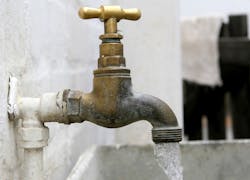Flint, Mich., Water Meets Federal Lead & Copper Rule
The city of Flint, Mich.'s water system tested below action levels of the federal Lead and Copper Rule and at levels comparable to cities of a similar size and age of infrastructure in Michigan and across the nation. The Michigan Department of Environmental Quality (MDEQ) provided this notification of this finding, which was based on results from the most recent six-month monitoring period, to the Mayor of Flint.
"This is good news and the result of many partners on the local, county, state and federal levels working together to restore the water quality in the City of Flint,” said MDEQ Director Heidi Grether. “The Flint water system is one of the most monitored systems in the country for lead and copper, and we remain committed to continuing work in Flint as the city recovers.”
The 90th percentile lead value of samples collected from Tier 1 sites for the six-month compliance period between July 1, 2016, and Dec. 31, 2016, was 12 ppb, which is less than the 15 ppb action level for lead. Tier 1 sites are residential sites confirmed as having lead service lines or copper plumbing with lead solder installed between 1983 and 1988.
Further, the four rounds of sentinel site sampling collected within the same six-month compliance period indicate the system continues to recover, with the 90th percentile value of the most recent round of sentinel site test results at 8 ppb.
“The remarkable improvement in water quality over the past year is a testament to all levels of government working together and the resilient people of Flint helping us help them through participation in the flushing programs,” said Gov. Rick Snyder. “There is still more work to do in Flint, and I remain committed to helping the residents recover and restore their city. Programs related to providing water filters, funding lead service line replacements, increasing access to health care, improving educational opportunities, growing Flint’s economy and more will continue. It was important to attain a water quality that remains below action levels of the federal Lead and Copper Rule and is comparable to cities with similar size and age of infrastructure in Michigan and the U.S. This is not the end of our work in Flint, but it is one more step along the path toward Flint’s future.”
In its letter, the DEQ laid out a series of actions the city must continue to take to remain in compliance with the Lead and Copper Rule and the Safe Water Drinking Act as a whole.
The State of Michigan has been providing water credits to help residents pay for water they could not use because it did not meet state and federal quality standards. The remaining credits will be available to help pay for water used through the end of February. The state has been providing water credits for water use dating back to April 2014.
The state also has been paying for the city’s source water from the Great Lakes Water Authority since October 2015. The state will continue to provide funding for source water through the end of February.
As a reminder, the state continues its recommendation that residents use filtered water for drinking and cooking for everyone in their household due to the chance for disruption to pipes as the city replaces lead service lines. The state will continue to provide filter cartridges because of the ongoing lead service line replacement.
Source: Michigan Department of Environmental Quality
